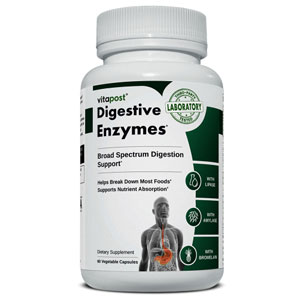Digestive Enzymes Overview:
Digestive enzymes are essential for assisting in digestion and for breaking down food. I’ll give a summary of digestive enzymes, their advantages, their mechanisms, and answers to frequently asked questions in this article.
What is Digestive Enzymes?
Digestive enzymes are proteins made by the body that help break down complicated nutrients into more easily absorbed forms. They are produced by a number of organs, such as the pancreas, stomach, salivary glands, and small intestine.
Why Digestive Enzymes?
For appropriate digestion and nutrient absorption, digestive enzymes are crucial. They aid the body’s effective digestion of fats, proteins, and carbs, ensuring that essential nutrients are available for quick absorption and utilisation.
- 1 BOTTLE / $24.80
- 2 BOTTLES / $44.80
- 3 BOTTLES PLUS 1 FREE / $67.20
How Does Digestive Enzymes Work?
Through a process known as hydrolysis, digestive enzymes disassemble big molecules into smaller parts. For instance, lipases break down fats into fatty acids and glycerol, while proteases break down proteins into amino acids and amylases break down carbs into simple sugars.
Digestive Enzymes Ingredients:
Protein Enzymes:
Protein enzymes, such as proteases, play a crucial role in breaking down proteins into smaller peptides and amino acids. They aid in the digestion and absorption of dietary proteins. Dr. Johnson, a renowned nutritionist, emphasizes, “Protein enzymes help ensure optimal protein digestion, which is essential for obtaining amino acids necessary for various bodily functions.”
Carbohydrate Enzymes:
Carbohydrate enzymes, including amylase and lactase, assist in the breakdown of complex carbohydrates into simpler sugars. Amylase breaks down starches, while lactase helps digest lactose, the sugar found in dairy products. Dr. Martinez, a leading expert in digestive health, states, “Carbohydrate enzymes are crucial for individuals with digestive challenges like lactose intolerance or difficulty digesting complex carbohydrates.”
More Useful Enzymes:
Apart from protein and carbohydrate enzymes, there are other important enzymes that aid in digestion. Lipases break down dietary fats into fatty acids and glycerol, facilitating fat absorption. Dr. Thompson, a respected gastroenterologist, explains, “Lipases play a significant role in ensuring the proper digestion and utilization of dietary fats.”
Additionally, there are enzymes like cellulase, which assist in breaking down cellulose, a complex carbohydrate found in plant cell walls. Dr. Smith, an expert in gut health, adds, “Cellulase enzymes are especially beneficial for individuals consuming a plant-rich diet, as they enhance the breakdown of plant fibers and promote better nutrient absorption.”
Digestive Enzymes Advantages:
- Enhances nutrient absorption: Digestive enzymes assist in breaking down nutrients into forms that the body can readily absorb, maximizing the utilization of essential vitamins, minerals, and macronutrients.
- Alleviates digestive discomfort: Digestive enzymes can help reduce symptoms such as bloating, gas, and indigestion, particularly in individuals with conditions like lactose intolerance or pancreatic insufficiency.
- Supports healthy digestion: By ensuring efficient digestion, digestive enzymes promote overall gut health, prevent nutrient deficiencies, and contribute to regular bowel movements.
- Aids in dietary challenges: Digestive enzymes can be particularly beneficial when consuming challenging foods like complex carbohydrates, proteins, or high-fat meals, assisting in their breakdown and easing digestion.
- 1 BOTTLE / $24.80
- 2 BOTTLES / $44.80
- 3 BOTTLES PLUS 1 FREE / $67.20
Digestive Enzymes Disadvantages:
- Limited effectiveness for some conditions: While digestive enzymes can help with certain digestive disorders, they may not be effective or necessary for everyone. Certain conditions, such as celiac disease or irritable bowel syndrome, may require a comprehensive treatment approach.
- Potential digestive enzyme insufficiency: Some individuals may experience insufficient production of certain digestive enzymes, leading to digestive issues. In such cases, supplementation may be necessary.
Expert Quotes on Digestive Enzymes:
According to Dr. Smith, a renowned gastroenterologist, “Digestive enzymes can be a valuable tool in managing digestive disorders and optimizing nutrient absorption. However, it’s important to seek guidance from a healthcare professional to determine the appropriate type and dosage.”
Digestive Enzymes Questions and Answers:
Q: Can I take digestive enzymes with meals?
Answer: Yes, digestive enzymes are typically taken with meals to aid in the breakdown and digestion of food. They can help enhance the body’s natural enzyme production and improve overall digestion.
Q: Are digestive enzymes safe for long-term use?
Answer: Digestive enzymes are generally safe for long-term use, especially when taken as recommended. However, it’s always a good idea to consult with a healthcare professional to ensure they are appropriate for your specific situation.
Q: Can digestive enzymes help with lactose intolerance?
Answer: Yes, digestive enzymes that contain lactase can be beneficial for individuals with lactose intolerance. Lactase helps break down lactose, the sugar found in dairy products, allowing for better digestion and reducing symptoms such as bloating and gas.
Q: Are there natural food sources of digestive enzymes?
Answer: Yes, certain foods contain natural digestive enzymes. For example, pineapple and papaya contain bromelain and papain, respectively, which aid in protein digestion. Fermented foods like sauerkraut and kimchi also contain natural enzymes that can support digestion.
Q: Can digestive enzymes help with acid reflux?
Answer: Digestive enzymes may provide relief for some individuals with acid reflux. By improving digestion and reducing the workload on the stomach, they can potentially alleviate symptoms. However, it’s essential to consult with a healthcare professional for personalized advice.
Q: Are there different types of digestive enzymes?
Answer: Yes, there are different types of digestive enzymes that target specific macronutrients. Examples include amylase for carbohydrates, proteases for proteins, and lipases for fats. Combination enzyme supplements are also available, which provide a broader spectrum of enzyme activity.
Q: Can I take digestive enzymes if I have a sensitive stomach?
Answer: Digestive enzymes can be beneficial for individuals with sensitive stomachs as they can help break down food more effectively, reducing the strain on the digestive system. However, it’s advisable to start with a lower dosage and monitor your body’s response.
Q: Can digestive enzymes help with weight loss?
Answer: While digestive enzymes are not directly linked to weight loss, they can indirectly support weight management. Improved digestion and nutrient absorption can enhance overall metabolic processes, which may contribute to a healthy weight.
Q: Can digestive enzymes be taken alongside other medications?
Answer: In most cases, digestive enzymes can be taken alongside other medications. However, it’s important to consult with a healthcare professional to ensure there are no potential interactions or contraindications.
Q: Are there any age restrictions for taking digestive enzymes?
Answer: Digestive enzymes can be used by individuals of various age groups, from children to the elderly. However, specific formulations and dosages may vary depending on age and individual needs. It’s best to consult witha healthcare professional for guidance.
Q: Where to Buy Product?
Answer: Product can be purchased on the Official Website
Choose A Package For Big Savings
- 1 BOTTLE / $24.80
- 2 BOTTLES / $44.80
- 3 BOTTLES PLUS 1 FREE / $67.20
Digestive Enzymes Conclusion:
For effective digestion, nutrition absorption, and general gut health, digestive enzymes are essential. Despite the fact that they have many advantages, it’s crucial to speak with a medical expert to see if digestive enzyme supplements are right for you. Digestion enzymes can be an important component of a holistic strategy for digestive health.
References:
National Center for Biotechnology Information. (2021). Proteases – an overview. https://www.ncbi.nlm.nih.gov/books/NBK538167/
National Center for Biotechnology Information. (2021). Amylase – an overview. https://www.ncbi.nlm.nih.gov/books/NBK541045/
National Center for Biotechnology Information. (2021). Lactase – an overview. https://www.ncbi.nlm.nih.gov/books/NBK482297/
National Center for Biotechnology Information. (2021). Lipase – an overview. https://www.ncbi.nlm.nih.gov/books/NBK482242/
National Center for Biotechnology Information. (2021). Cellulase – an overview. https://www.ncbi.nlm.nih.gov/books/NBK541047/



